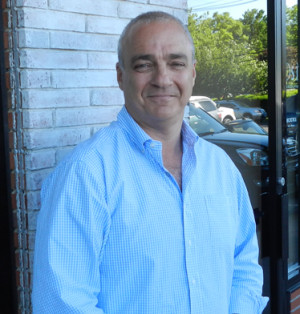Progressive Prison Project
Greenwich, Connecticut


A Man Of Many Collars
By Patrick Gallagher
When asked about the frequency of individuals with both a Juris Doctor and a Master of Divinity degree, Jeff Grant replied — with a chuckle — “There are more of us than you would think.”
Grant, a Greenwich resident, associate minister and director of prison ministries of First Baptist Church of Bridgeport and vice chairman of the board of Family ReEntry Inc., has made it his mission to empower the incarcerated and former prisoners to get their lives on the right track.
“The purpose is to humanize the issue — that these are real problems that are happening to real families,” Grant said, “and at the end of the day, how can these people go through a positive transformation to change their lives and be of a better value to their society.”
In that particular instance, though, the people Grant referenced are not your typical inmates.
Grant’s calling — and the area in which he spends most of his time — is the inner-city prison ministry. But here, Grant refers to a different class of criminals: people convicted of so-called white collar crimes.
Prison, Grant says, has a funny way of leveling the playing field between the Gold Coast financiers and the inner-city gangsters.
In the past, someone from a place like Greenwich might have looked at the wave of drug- and vice-related crimes in a place like Bridgeport and said, “It’s not my problem, it won’t affect me,” but now, Grant said, “We’re in a new age when crime and criminal justice issues are pervasive, and it affects everyone in every community.”
Sitting across from Grant, it’s just barely discernible that he speaks from experience.
In 2006, Grant, a former corporate lawyer with an office in Mamaroneck, N.Y., was sentenced to 14 months in a low-security prison after pleading guilty to federal fraud charges. He was charged with falsely claiming in a loan application to the U.S. Small Business Administration to have had an office on Wall Street that was impacted by the Sept. 11 terrorist attacks.
Prison, he said, “was a profound experience for me.”
“It was something I found that I needed — it wasn’t something I looked forward to, but once I got there it was something I understood as fundamentally cleansing,” Grant said. “When I came out, I was able to be more empathetic and compassionate and understanding of the plights of others, including my family, who’d been put through an unfair journey that wasn’t of their making.”
After his release from prison, Grant volunteered with various nonprofits that helped rehabilitate former convicts as they re-entered society. He found Family ReEntry in Bridgeport, where he initially helped to transform a blighted block across from the First Baptist Church that had been home to drug addicts and prostitutes into a community garden.
“And that was where it all started,” he said.
Later, his minister at the Second Congregational Church in Greenwich would suggest that he consider entering the seminary, which Grant did in 2009. He graduated last year from Union Theological Seminary, which is affiliated with Columbia University, and in late 2012 was appointed to First Baptist Church in Bridgeport.
All the while, beginning in 2008, Grant said local individuals convicted of white collar crimes and their families would reach out to him for advice and counseling.
“Since I lived in Greenwich and people knew I had been a white collar criminal, word got around that I had information that could help people with their own white collar issues,” Grant said. “And I started to get phone calls.”
He attributed much of that to the shared experience. “In places like Greenwich, once someone is accused of a crime, they’re cut off from their community. I understood that, because I had gone through that myself.”
The issues that define both the inner-city and white collar criminal communities — feelings of isolation, shame, guilt, remorse; economic struggles; and legal and family issues — are one and the same, Grant said. He said the two communities have much to learn from one another.
“The things that the suffering community had in Bridgeport were almost identical to those of the white collar community,” he said. “And so, by empowering the Bridgeport community to speak up for itself, it actually empowers the Greenwich community as well.”
The informal consultations with white collar criminals and their friends and families has grown into the Progressive Prison Project.
“It’s a ministry,” Grant said, “and it’s unfolding now in kind of interesting and magical ways. … It’s not like I have a business plan — I have a ministry that’s in its infancy.”
He said the ultimate goal is to foster a compassion between communities, where, in the past, a lack of compassion has led to a social divide.
“I think it’s about learning how to conduct this ministry in balance and in ways that are going to be healthy and harmonious between the communities.”
Reprinted from: http://westfaironline.com/55603/a-man-of-many-collars/
Jeff Grant, JD, M Div
Minister, Activist,
Social Ethicist, Author
Director, Progressive Prison Project
Greenwich, Connecticut
Assoc. Minister/
Director of Prison Ministries
First Baptist Church of Bridgeport
126 Washington Avenue, 1st Fl.
Bridgeport, Connecticut 06604
(203) 339-5887
jgrant3074@icloud.com
jg3074@columbia.edu

No comments:
Post a Comment